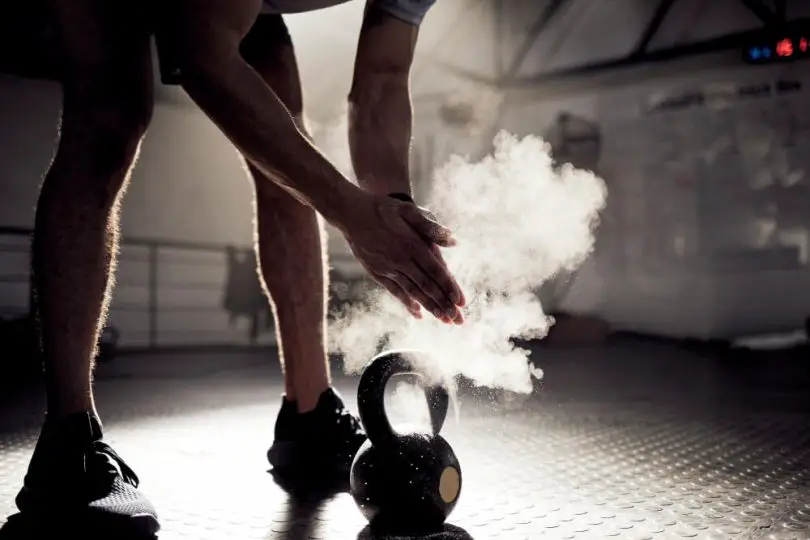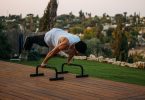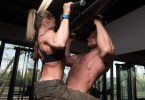Why Gyms Do Not Allow Chalk
The use of chalk is often regarded as an essential part of a strength training program involving powerlifting or Olympic weightlifting exercises.
With chalk, not only can you lift heavier weights with more confidence, but it also acts as a safety feature by keeping the bar in place during overhead movements or deadlifts.
You might be surprised to learn that many gyms actually forbid the use of chalk, despite the fact that it is considered a necessity when performing heavy lifts.
Chalk isn’t allowed in “commercial” gyms unless you’re training for bodybuilding, powerlifting, or CrossFit.
So, why do gyms not allow chalk in their facilities?
Commercial gyms are the ones that don’t allow chalk. For starters, commercial gyms have limited resources and cannot afford to spend time cleaning equipment that has been soiled with chalk.
The second reason is that commercial gyms are wary of attracting members who might be characterized as “hardcore lifters“.
As it turns out, there are quite a few reasons why gyms forbid chalk use.
What’s the Point of Having Chalk in a Gym?
There are a number of reasons why commercial gym franchises do not allow their members to use chalk while working out.
-
Hardcore lifters are not welcomed
The truth is that many of these gyms aren’t interested in attracting certain types of customers.
People who compete in professional bodybuilding and powerlifting contests, are typically not their favourite customers.
These are the people who will actually make use of a gym membership if they have one. The most profitable customers are those who don’t use their memberships at the big gyms.
They’re paying for a service, but the gym equipment isn’t getting any use. Members who never step foot in a gym are the most profitable for large gym chains because they incur the fewest expenses and account for the majority of revenue.
-
Intimidation
Gym owners face a second issue, which is the influx of certain types of customers. Imposing images of other people tend to repel the average targeted customer.
When the average person walks into a gym full of powerlifters, they automatically assume that the place is only for “pros,” and that the trainers there won’t be able to assist them.
Chalk is banned in many gyms that cater to affluent clients, but for different reasons:
-
Saves cleaning costs
Powerlifting and bodybuilding gyms allow the use of chalk because it is an essential part of the training regimen for many lifters.
These gyms also have members who don’t care about their gym equipment being spotless (though they still expect clean and hygienic equipment).
Commercial gyms, on the other hand, tend to operate on a tight financial budget.
It’s difficult to remove chalk from the knurling of dumbbells and barbells, so their staff tends to put it on the back burner.
It’s a known fact that no one enjoys cleaning exercise equipment like bars and benches.
In order to reduce the amount of time it takes for gym staff to clean the gym’s equipment outside of the daily cleaning schedule, gyms have banned the use of chalk in their facilities.
-
Allergy Issues with Chalk
Magnesium carbonate is a naturally occurring mineral that can be used to increase one’s grip strength.
That’s why everyone uses it, from pro gymnasts to amateur powerlifters. As a result, it generates a lot of fine dust. Asthma and other breathing issues affect many other fellow gym members.
Those who suffer from such ailments may be adversely affected by the presence of magnesium carbonate in the air. It’s possible that some people are allergic to chalk, and they may not even know it.
-
Gym Equipment Can Be Damaged by Chalk
For the most part, chalk is used because of its exceptional ability to absorb moisture from the user’s skin.
However, it also draws moisture from the air, and in a gym where many people sweat, there is a lot of it. A small dust particle can get inside the bushing and bearing of a bar if there is a crack in it.
Accumulation of chalk will also lead to an increase in moisture in places where neither gym owners nor their customers want it, which will eventually lead to corrosion.
Gym owners try to avoid having to deal with the hassle of properly cleaning their equipment of chalk residue.
When You Can’t Use Chalk in the Gym, What’s the Best Replacement?
If you don’t have access to chalk in your gym, there are still ways to improve your bar grip.
Avoiding the use of chalk is the most obvious solution to this problem; after all, the vast majority of people who are reading this are unlikely to require it.
Not everyone needs to use chalk unless they are doing Olympic lifts, where the safety of the grip is critical, or they are lifting heavy weight (if your grip is struggling on a 315lb deadlift you need to work on grip strength rather than an external accessory like chalk).
The following are some suitable substitutes for gym chalk for those who do require it:
-
Gloves are an alternative
Gloves are a tried-and-true method of improving your grip on just about anything. There are literally thousands of options available.
For better sweat evaporation and finger dexterity preservation, they are always designed without fingers.
Some even have an open-back design.
Wrist straps, a common design feature, are designed to keep your wrists safe and secure.
Silicon pads are strategically placed in many gloves to prevent calluses or ripping your palms open, making them more comfortable to wear.
Printed rubber or silicone grip surfaces are the most common ways to improve your grip on the bar, but depending on the model, there may be other options.
There are full-finger gym gloves on the market if you are concerned about the safety of your fingers and nails. If you’re doing shrugs and deadlifts, these can come in handy, not just for smooth bars but also for those with etchings.
-
A pair of securing straps
Heavy-duty materials are used to make lifting straps, which are designed to give users better grip and control when performing heavy lifts.
Basically, it’s just a looped piece of material with a dangling piece of the same material that goes around the bar when you’re wearing it. You can categorize them according to the different functions they perform.
Lifting grips, lasso lifting straps, Olympic lifting straps, and figure-eight lifting straps are all available. All of these types have a specific purpose, and you should choose the one that best fits your lifting style depending on your needs.
If you plan to use straps, remember that they are not a substitute for a weak grip. Because grip and forearm muscles fatigue first, straps are used to isolate these muscles from the rest of your body (like barbell rows or shrugs).
If you can’t lift heavy weights because of a weak grip, you should avoid straps and focus on strengthening your grip instead. If you don’t, you’ll be doing more harm than good to yourself and your career.
-
Liquid Chalk is another alternative
Liquid chalk has never been banned in a gym, despite the fact that many do. Rock climbing and other activities where re-chalking your hands is difficult led to the development of this device.
You can use it in gyms that ban chalk because it has a longer-lasting effect on your skin and is less messy than normal chalk.
It’s a simple mixture of chalk and rubbing alcohol, ethanol, or isopropyl in its most basic and cheapest form.
In some cases, a fragrance is added to mask the alcoholic scent. To make the chalk stick to your skin even more firmly, some higher-end brands add colophony or similar substances to the formula.
Final thoughts on why gyms do not allow chalk
If you’re a serious lifter, you’re probably already a member of a gym with a wide selection of equipment and a supportive training environment (meaning chalk is allowed).
It’s likely that those who are new to the gym and training at a high level were surprised to learn that their gym does not allow chalk.
While this is common in commercial gyms, they prefer to attract “casual” gym-goers rather than “hardcore” weight-lifters in order to save money on cleaning costs.
In order to get around this, you can use lifting straps or use liquid chalk, which is significantly less messy than traditional chalk.
Instead of going through all the trouble, just follow this community’s lead and build a home gym where you get to set the rules yourself!







